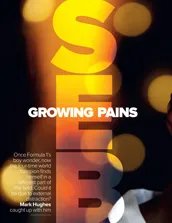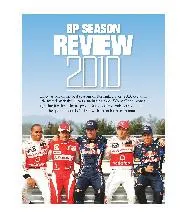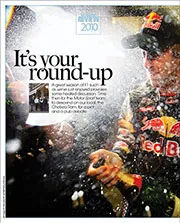Without this synchronisation, the results just don’t come, says Rocky, suggesting that it’s likely to be the root of his problems this season — rather than a loss of his powers.
“There’s thousands of factors that we don’t know about [at Ferrari],” he says. “I just think one thing we know for sure: There’s a really big difference between somebody who’s been four-times world champion, and someone who’s won a couple of races in terms of approach and attitude.
“Sebastian is looking for things in the car to win the world championship. He knows what it takes. When the ingredients aren’t there it must be quite difficult to motivate yourself and produce the results that you need to finish fourth or fifth, which is not what he’s after in his career.”
It wasn’t a Red Bull that set the fastest laps in 2010 preseason testing but many saw through the timesheets and realised that the Milton Keynes squad had the quickest car. Qualifying at Round One in Bahrain confirmed as much, with Vettel taking pole at a canter.
However, things didn’t go quite so well on Sunday. “I remember the first race was actually pretty crap,” says Rocky. “So it didn’t fill us with confidence. We only led the championship at the last race and there are reasons for that…”
A cracked exhaust due to a spark plug failure snatched the win away from Red Bull and their young charge, who eventually finished fourth. Whilst perhaps not dominating, Vettel had been keeping Fernando Alonso at arms length before the failure, who admitted he “could do nothing” about the German while his RB6 was on song.

Dawn of the Red Bull era: Vettel wasn’t fastest in 2010 preseason testing but his pace was clear
Jean Michel Le Meur/DPPI
The second race at Melbourne’s Albert Park was again ecstasy usurped by agony. Vettel took another pole, but a wheel nut issue sent him spinning out whilst leading comfortably.
The car was fast, but could it finish at the front?
“We thought we had the potential,” remembers Rocky. “There were several reliability issues with the power unit, and I don’t know how you want to phrase that, because obviously it’s quite political.
“But we had issues with Renault, which meant that along the way there was always something on top of our heads, ready waiting to fall. There were lots of pressures, you never knew [what was going to happen].
“Blaming it all on Renault is not politically correct, but we thought it was a bit out of our hands. It’s not really that Sebastian couldn’t do it or the car couldn’t do it.”

As reliability improved, the 2010 season came to Vettel
Grand Prix Photo
Finally at Round Three in Malaysia, it all came together. Mark Webber had set fastest time in qualifying, but was caught napping on lap one. He left the door wide open going into the first corner and Vettel swooped through, never looking back. He and his team took a first win of the year and finally got their 2010 season underway.
It had been a perfectly managed race, with the German leading all but two of the Grand Prix’s 56 laps. The Red Bulls were quite simply devastatingly quick – particularly Vettel.
This raw pace helped the German with tyre management, which had once again become a significant factor in F1. With refuelling banned for 2010, the extra fuel load resulted in heavier cars – the knock-on effect being greater tyre wear.
Rocky explains: “One thing that always helps [is that] he was really quick. If you’re quick and a second faster than everybody else, you know that if you drive 80 per cent and you’re only half a second faster than everybody else, then your tyres are going to save themselves. You’re in the lead, there’s nobody racing you. If you mind traffic and things like that it just comes naturally. I think speed was everything, then the other things just come with it.”

Vettel and Webber collided in Istanbul
Francois Flamand/DPPI
Despite this combination of speed and confidence, it took Vettel six more rounds to win another race. A poor start and misguided strategy threw away a possible win in China, whilst having a race-ending collision with team-mate Webber while leading in Turkey didn’t help his cause either.
When Vettel did manage to take his second 2010 win on the streets of Valencia for the European Grand Prix, he was third in the drivers’ championship with his team second in the constructors’. They weren’t out of touch with the leaders, but they were struggling to turn dominant pace into corresponding results.
“We used to play catch up a bit in terms of the development, the car used to be ready quite late,” the engineer explains. “We had reliability issues, so you were running around a bit trying to find a direction.







